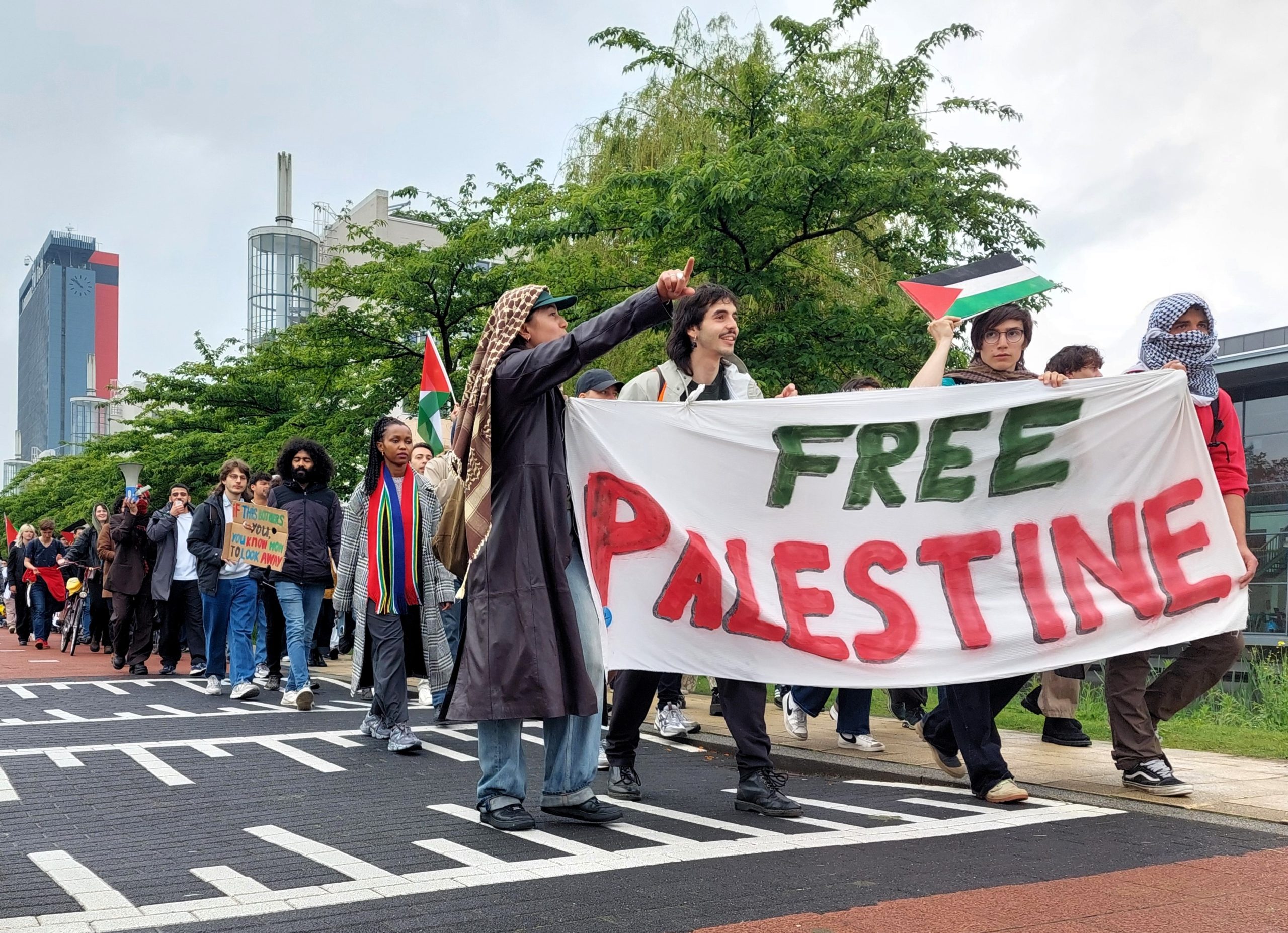The planned meeting between pro-Palestinian protesters and the Executive Board on Thursday was limited to handing over the demands and setting a date for a new meeting. Afterwards, almost 100 people joined a protest march.
Pro-Palestinian protest march on the TU Delft campus. (Photo: Marjolein van der Veldt)
The protesters had been hopeful. During last Monday’s walk-out, Vice Executive Board Chair Rob Mudde dropped by for a chat after just half an hour. In that brief discussion, Tom Twigt, the face of the demonstrations, and Mudde agreed to talk further on Thursday.
But after that meeting on Thursday, Twigt felt ‘dismissed’, he told Delta later. “I am disappointed. They dropped clear hints that we had to keep it short. Hopefully we will have a real discussion next time.”
Twigt and three co-protesters – including Associate Professor Filippo Santoni de Sio and a spokesperson for BK Scholars for Palestine – were invited to the Faculty of Mechanical Engineering (ME). Once there, a staff member of the Safety and Security Department accompanied them to an unfurnished room on the ground floor. There were no chairs. Vice-Executive Board Chair Rob Mudde and Fred van Keulen, the Dean of ME, arrived a little later.
Complete transparency
After an introduction round, the protesters, as was agreed on Monday, handed over a document containing their demands to Mudde. Like the activists at other universities, their demands include complete transparency about and cutting ties that TU Delft has with Israeli universities and companies; solidarity with oppressed Palestinian academics; and public condemnation of the ‘ongoing genocide in Gaza’.
Before the substance could be adressed, Mudde said that he would like to continue discussing the subject next week. When that new meeting will take place is as yet unknown.
The spokesperson cannot say whether TU Delft will listen to the call for transparency. He says that the universities are ‘towing the same line’. The extent to which TU Delft can show the partnerships ‘depends on what that shared line will be if it comes’. Some other universities have already shared the wanted information.
Protest march
The third protest in a short space of time started after the meeting with Mudde. It began at the Free Zone at the EEMCS Faculty, as the previous two had done. Twigt briefly summarised the meeting with the Executive Board there. After his speech the group of around 100 people started moving.
The protesters say that they will continue protesting for as long as the Executive Board does not meet all their demands
Holding up banners and protest signs, they walked to the area between the Aula and the Library. The protesters chanted slogans such as “Shame on TU Delft” and “Disclose, divest, we will not stop, we will not rest” across campus. They stopped beneath the grass roof of the Library. Within an hour after the protest started at the Free Zone, they went their separate ways.
The protesters say that they will continue protesting for as long as the Executive Board does not meet all their demands. Their intention is for the demonstrations to proceed peacefully. To ensure that this is the case, the organisation is in continuous contact with the Safety and Security Department at TU Delft.
Other universities
Other university cities saw less peaceful demonstrations this week. There are tented camps at the moment in Groningen, Maastricht, Wageningen and Nijmegen. Protesters dismantled their camp after continuous rain showers in Eindhoven. At Erasmus University, protests planned for Thursday were cancelled because the university kept its doors closed as a preventive measure.
On Thursday, the University of Amsterdam opened again (in Dutch) after being closed for a few days after large protests there had recently gotten out of hand. In Utrecht, protests resumed yesterday evening after being cleared by the police.
In Leiden, the students kept fairly quiet. Till now. While the details of ‘several concrete steps’ that the university wants to take regarding its ties with Israel will be made known on Friday, their measures are not enough for the Students for Palestine pressure group, writes Mare, the university newspaper (in Dutch). About 50 protesters occupied the building on the Wijnhaven in The Hague, which is part of the University of Leiden.



Comments are closed.